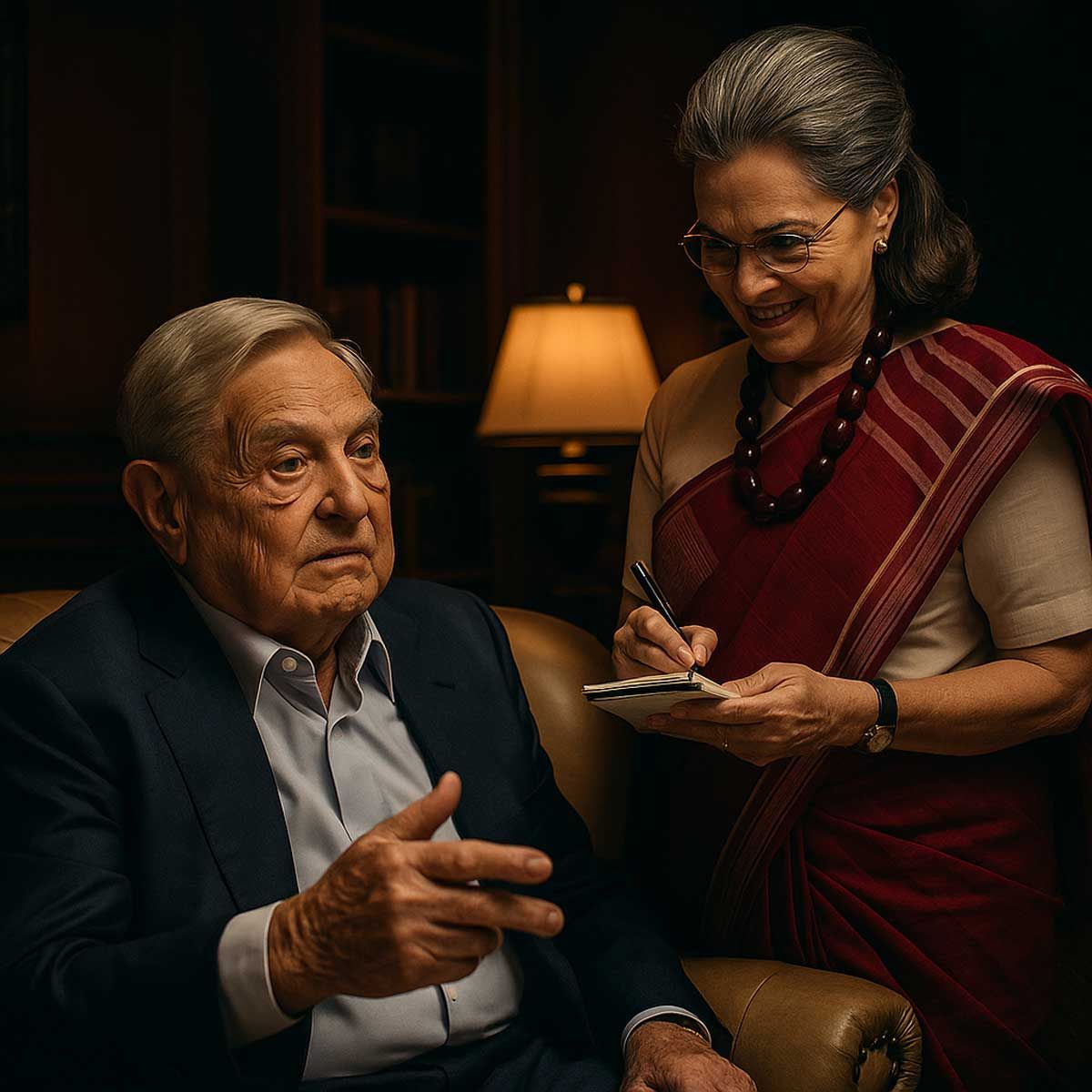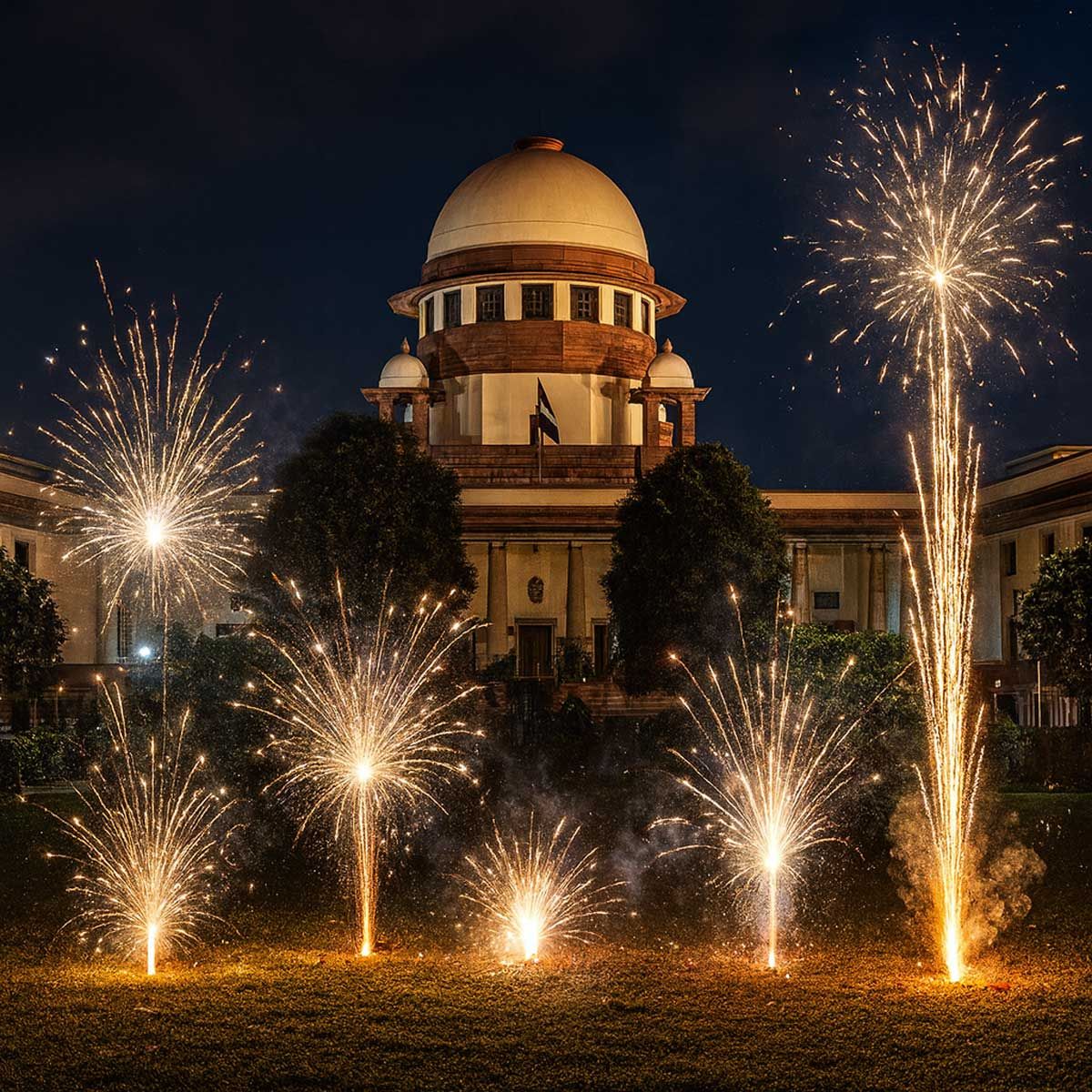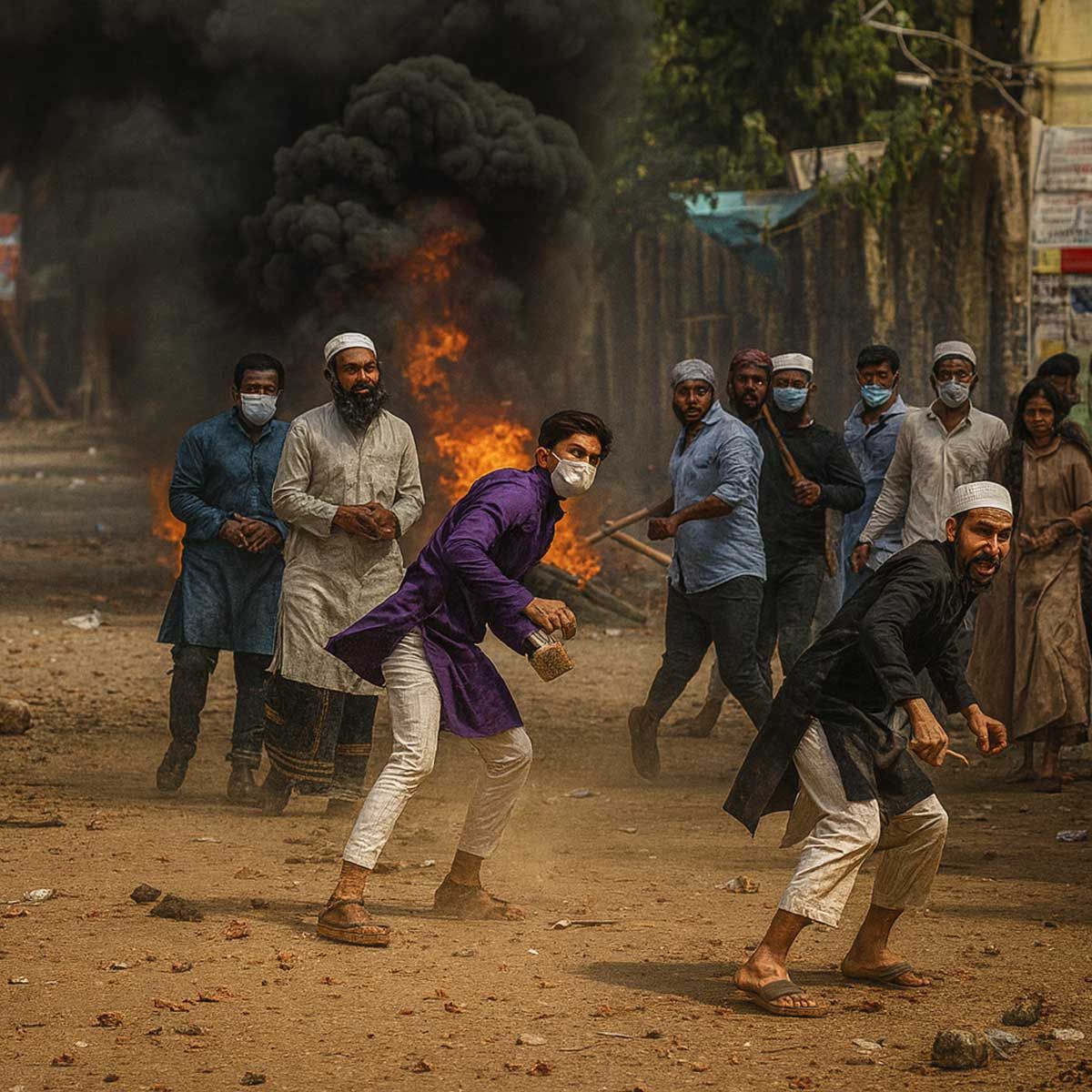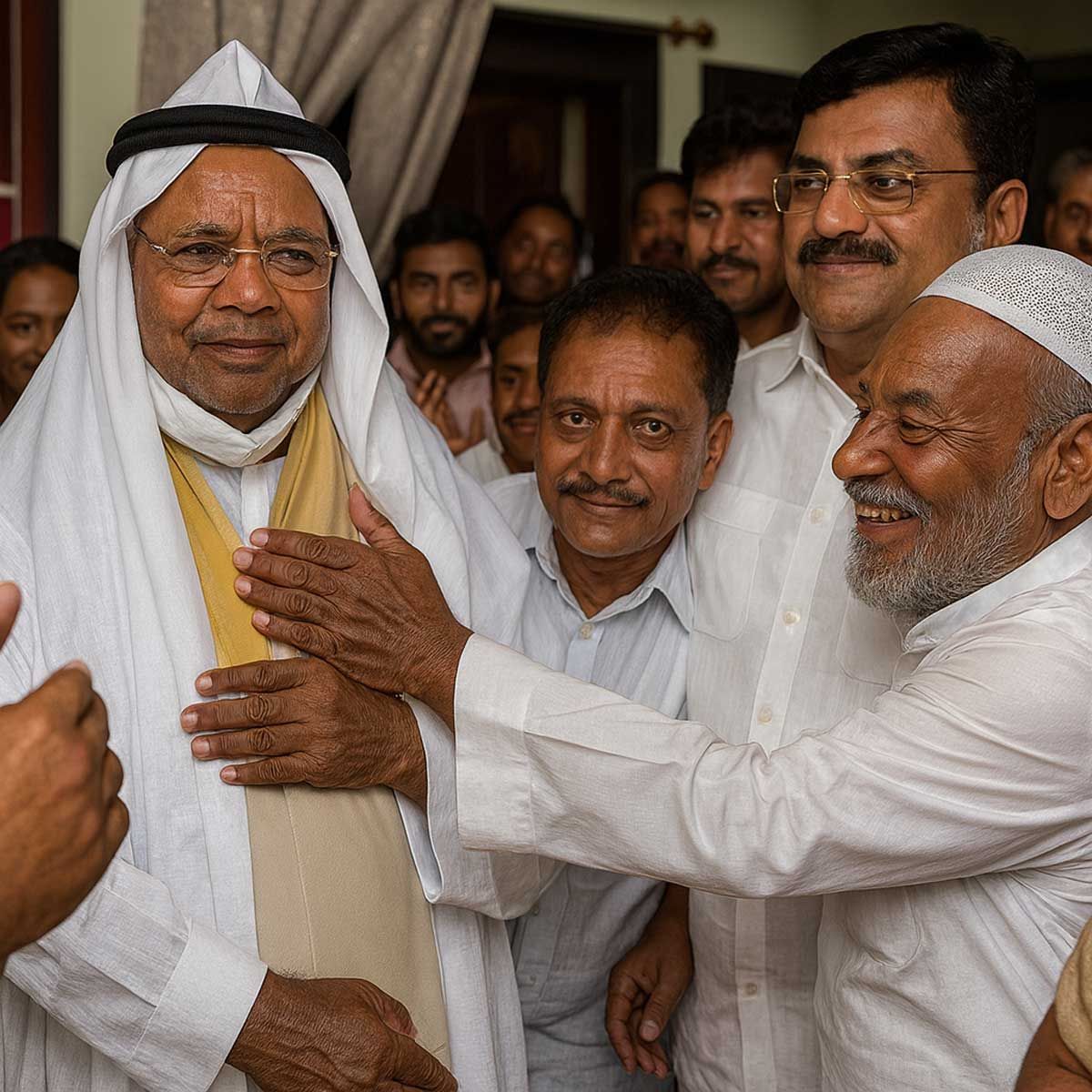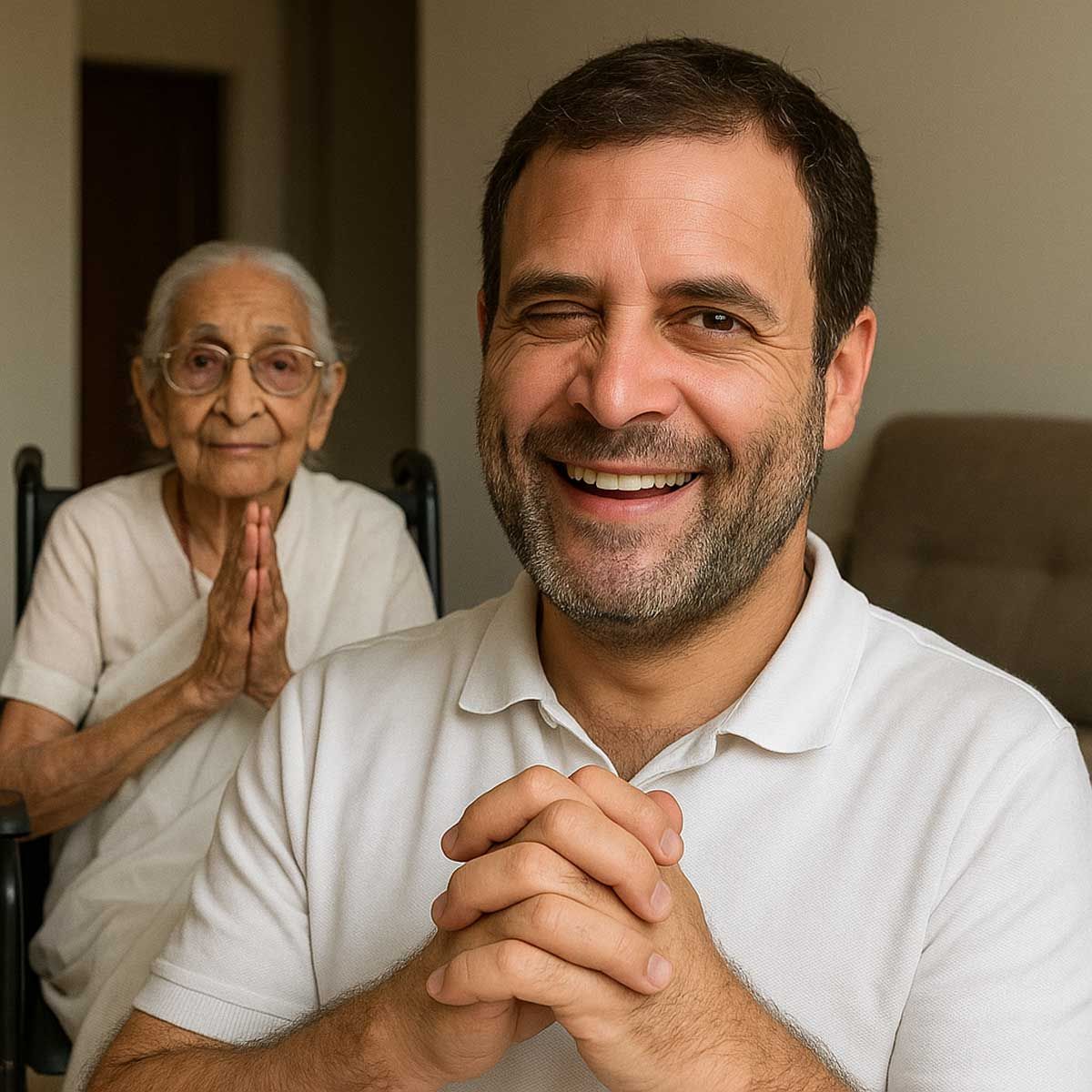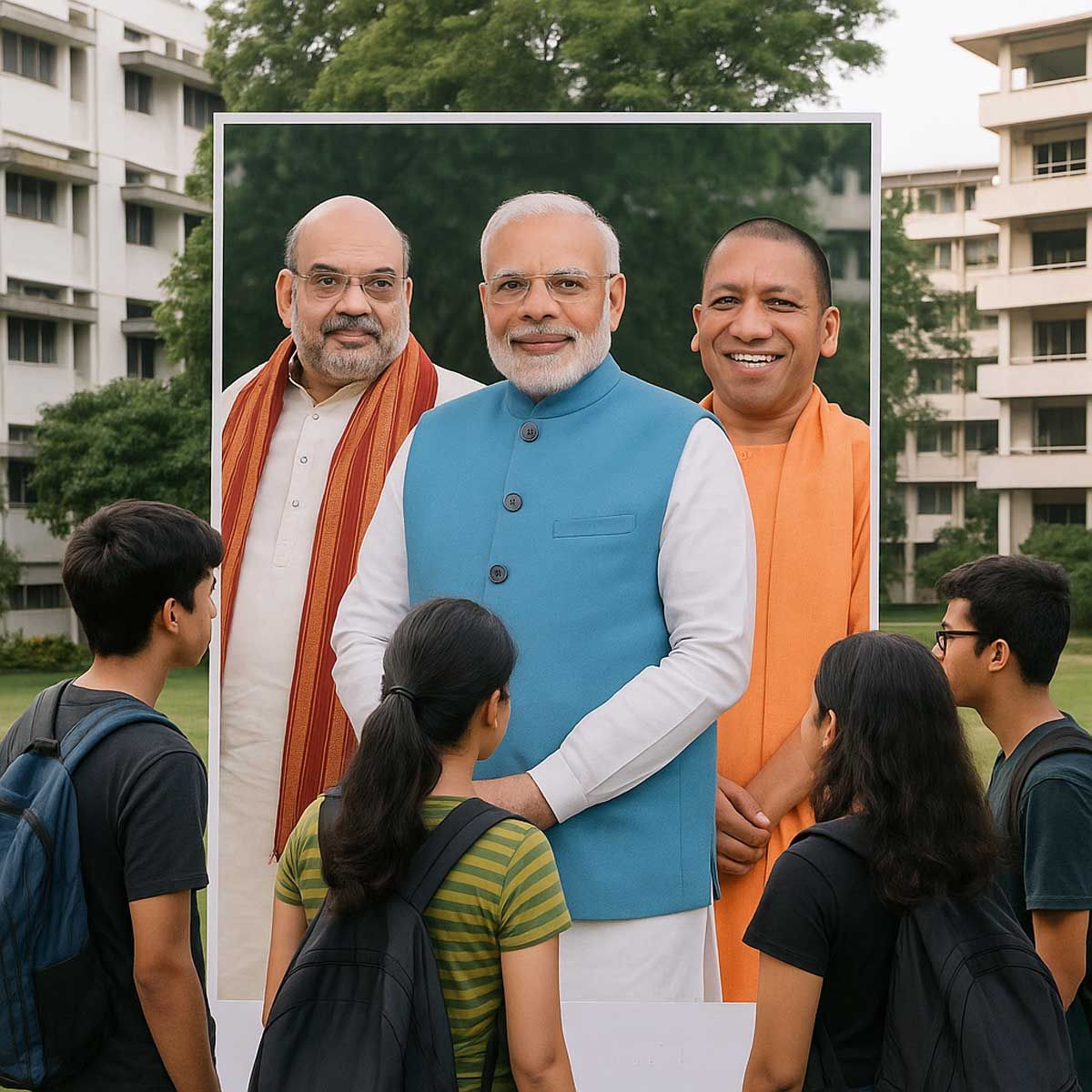More Coverage
Twitter Coverage
Satyaagrah
Written on
Satyaagrah
Written on
Satyaagrah
Written on
Satyaagrah
Written on
Satyaagrah
Written on
JOIN SATYAAGRAH SOCIAL MEDIA
Justice Bela M Trivedi upheld EWS rights, exposed fake PILs, denied bail in big scams, and stood firm on law—yet the SCBA snubbed her, revealing how the ecosystem punishes those who refuse to bend, even when justice is on their side

The retirement of Justice Bela M Trivedi from the Supreme Court of India, after over three and a half years of distinguished service, was meant to be a moment of celebration and reflection. Instead, it turned into a flashpoint of controversy, exposing deep tensions within the legal community. In an unprecedented break from tradition, the Supreme Court Bar Association (SCBA), led by Senior Advocate Kapil Sibal, decided not to hold a farewell function for Justice Trivedi, a move that drew a sharp and public rebuke from Chief Justice of India (CJI) BR Gavai.
Presiding over a ceremonial bench on May 16, 2025, to mark Justice Trivedi’s final working day, CJI Gavai expressed his dismay in no uncertain terms, highlighting the disrespect shown to a judge of her stature. This incident not only cast a shadow over her departure but also raised questions about the motives of the SCBA and the influence of a certain ideological ecosystem that appears to resent judges who uphold the law with unwavering integrity.
The decision to snub Justice Trivedi reveals a troubling pattern within the legal fraternity, particularly among those aligned with a leftist ecosystem that seems to prioritize personal and political agendas over institutional respect. Justice Trivedi, known for her strict adherence to the rule of law, has been a target of criticism from certain quarters, not for any failing in her judicial conduct but for her refusal to bend to popular or political pressures.
|
As CJI Gavai rightly pointed out, the SCBA’s refusal to honor a retiring judge is a departure from a long-standing tradition that symbolizes the mutual respect between the Bench and the Bar. This act of omission speaks volumes about the mindset of those who orchestrate such decisions, particularly under the leadership of Kapil Sibal, whose actions have come under scrutiny for aligning with a clique that appears to resent judges who prioritize justice over populism.
Consider the case of Justice Trivedi’s judicial record, which has been nothing short of exemplary. In 2024, she took a bold stand against misconduct in the legal system by ordering a CBI inquiry into a group of lawyers and Advocates-on-Record (AOR) who had filed a fraudulent case in the Supreme Court using a forged vakalatnama. When the affected individual informed the court that he had not authorized the petition, Justice Trivedi’s bench acted decisively, stating, “The law is equal for everyone”, and directed the CBI to investigate. This move infuriated a section of the legal fraternity, including those who, like Kapil Sibal, argued for leniency toward the errant lawyers. Their pleas were rejected, as Justice Trivedi stood firm on the principle that no one, not even members of the Bar, is above the law. This decision earned her the ire of a powerful clique that thrives on manipulating the system through dubious means, exposing their discomfort with a judge who refuses to compromise on integrity.
The resentment against Justice Trivedi also stems from her rulings in high-profile cases that challenged the narratives of certain influential groups. For instance, her refusal to grant bail to Umar Khalid in a case under the Unlawful Activities (Prevention) Act (UAPA) drew significant backlash from those who champion causes aligned with the leftist ecosystem. Similarly, her decisions to deny bail to leaders like Satyendra Jain and to order a CBI investigation into DK Shivakumar further fueled the anger of this group.
Her dissent in a landmark case involving the Economically Weaker Sections (EWS) reservation, where she supported equal opportunities for the poor in the general category, also provoked criticism from those who oppose policies that challenge their ideological strongholds. Additionally, her past role as Law Secretary in the Gujarat government has been used to paint her as aligned with Prime Minister Narendra Modi, providing a convenient excuse for personal attacks rather than engaging with her judicial record. These instances highlight a pattern: Justice Trivedi’s commitment to cleaning up the system and upholding the law has made her a target for those who prefer a judiciary that can be swayed or manipulated.
The SCBA’s decision to forego a farewell for Justice Trivedi is not just a personal slight; it is an affront to the institution of the judiciary itself. As CJI Gavai noted during the ceremonial bench, the packed courtroom on her final day was a testament to her reputation as a fair and principled judge. He stated, “I must deprecate openly, because I believe in speaking plainly... The association (SCBA) ought not to have been such a stand”, emphasizing that differences in judicial philosophy should not justify denying a judge the respect she deserves. He further added, “So therefore, I am openly appreciating Sibal and Srivastava for their presence. Despite the resolution of their bodies, they are here. But what has been lost by the association, the presence of the Full House here, vindicates that she is a very very good judge. There are different types of judges, but that should not be a factor to deny what ought to have been granted”. The presence of a full courtroom, despite the SCBA’s boycott, underscores the legal community’s recognition of Justice Trivedi’s contributions, even if the association’s leadership chose to ignore them. This snub, orchestrated under Kapil Sibal’s watch, only tarnishes the SCBA’s reputation, not that of Justice Trivedi, whose legacy remains untarnished.
|
The Bar Council of India (BCI) also weighed in, urging the SCBA and the Supreme Court Advocates-on-Record Association (SCAORA) to reconsider their stance, stating that the denial of a farewell to a judge of such stature raises questions about institutional values. The BCI’s letter, addressed to Kapil Sibal and SCAORA President Vipul Nair, emphasized the importance of upholding traditions that reflect respect for judicial service.
The absence of a formal farewell, particularly when contrasted with the glowing tributes from the Bench and the Bar during the ceremonial proceedings, exposes the pettiness of those who let personal grudges dictate professional conduct. Justice Trivedi herself, in her farewell speech, reflected on the importance of institutional integrity, stating that it is the cornerstone of national integrity, a principle she upheld throughout her career.
Justice Trivedi’s journey is a testament to her resilience and dedication. Born on June 10, 1960, in Patan, Gujarat, she began her career as an advocate at the Gujarat High Court, specializing in civil and constitutional law for nearly a decade. In 1995, she made history by joining the Ahmedabad City Civil and Sessions Court as a judge, serving alongside her father, an achievement that earned them a place in the 1996 Limca Book of Records as the first father-daughter judicial duo in the same court. Her ascent through the judiciary included key roles such as Registrar (Vigilance) in the Gujarat High Court and Law Secretary in the Gujarat government, before her elevation to the Gujarat High Court in 2011 and the Supreme Court in 2021. Her landmark judgments, including her dissent in the EWS case and her rulings in high-profile criminal matters, reflect a judicial philosophy rooted in fairness, independence, and a refusal to bow to external pressures.
The SCBA’s actions, under Kapil Sibal’s leadership, reveal a troubling inclination to penalize judges who do not align with a particular ideological agenda. This incident is not an isolated one but part of a broader pattern where the leftist ecosystem seeks to undermine those who uphold the rule of law without fear or favor. By refusing to honor Justice Trivedi, the SCBA has not diminished her stature but has instead exposed its own biases. The public must now decide whether to stand with justice and integrity or with those who seek to manipulate the system for their own ends. As the Supreme Court moves forward, it is imperative that such attempts to shackle the judiciary with ideological biases are resisted, ensuring that the institution remains a beacon of justice, free from the clutches of any self-serving ecosystem.
Who is Justice Bela M Trivedi
Justice Bela M Trivedi, born on June 10, 1960, in the historic town of Patan, North Gujarat, stands as a towering figure in India’s judicial landscape. As the eleventh woman judge to grace the Supreme Court of India in its 75-year history, her elevation marked a significant milestone for gender representation in the judiciary. Her retirement in May 2025, after serving three-and-a-half years on the apex court, was meant to be a moment of celebration for her remarkable contributions. However, the Supreme Court Bar Association’s (SCBA) decision, under Kapil Sibal’s leadership, to forego a traditional farewell function cast a shadow over her departure, revealing the petty biases of a leftist ecosystem that resents judges who uphold the law without compromise. Despite this snub, Justice Trivedi’s legacy as a principled, fearless, and dedicated jurist remains untarnished, a beacon of integrity in a system often challenged by ideological pressures.
Justice Trivedi’s judicial journey is a story of perseverance and excellence. It began in July 1995 when she was appointed as a judge at the City Civil and Sessions Court in Ahmedabad, a role that marked her entry into the judiciary. This appointment was particularly historic, as she served alongside her father, earning them a unique place in the 1996 Limca Book of Records as the first father-daughter duo to serve as judges in the same court. Her early years as a trial court judge showcased her commitment to fairness and her ability to navigate complex legal matters with clarity and precision. From there, her career trajectory took her to significant roles, including Registrar (Vigilance) at the Gujarat High Court, where she ensured administrative integrity, and Law Secretary in the Government of Gujarat, a position that highlighted her expertise in legal policy and governance. On February 17, 2011, she was elevated to the Gujarat High Court, marking a new chapter in her judicial career. Her tenure then extended to the Rajasthan High Court from June 2011, before she returned to the Gujarat High Court in February 2016, bringing with her a wealth of experience and a reputation for impartiality.
The pinnacle of her career came on August 31, 2021, when she was appointed to the Supreme Court as part of a historic cohort of nine new judges, including three women—an unprecedented move that underscored the judiciary’s evolving inclusivity. Justice Trivedi’s tenure at the Supreme Court was defined by her participation in landmark constitutional rulings that shaped India’s legal and social fabric. One of her most notable contributions came in November 2022, when she was part of a five-judge Constitution Bench that, by a 3:2 majority, upheld the 10% reservation for Economically Weaker Sections (EWS) introduced in 2019, excluding SC/ST/OBC categories. This decision, which aimed to provide opportunities to economically disadvantaged individuals in the general category, was a significant step toward addressing economic inequality. Justice Trivedi’s support for the EWS reservation drew criticism from certain quarters, particularly the leftist ecosystem, which viewed it as a challenge to their narrative of caste-based reservations. Her stance, however, reflected her commitment to ensuring equal opportunities for all, regardless of ideological opposition.
In another landmark case, Justice Trivedi served on a seven-judge Constitution Bench in August 2024, which ruled 6:1 that states could create sub-classifications within Scheduled Castes to ensure benefits reached the most disadvantaged among them. Justice Trivedi, however, dissented, delivering a meticulously reasoned 85-page judgment. She argued, “only Parliament has the authority to alter the SC list, and states cannot make such classifications”. Her dissent was not a rejection of the need for upliftment but a defense of constitutional boundaries, emphasizing that such significant changes must come from the central legislature to maintain uniformity and prevent fragmentation. This principled stand, rooted in her deep understanding of constitutional law, further cemented her reputation as a judge who prioritized legal integrity over populist sentiment. Yet, it also fueled the resentment of those, including Kapil Sibal and his allies, who prefer a judiciary that aligns with their ideological leanings.
The controversy surrounding her farewell, orchestrated by the SCBA under Kapil Sibal’s leadership, only underscores the challenges faced by judges like Justice Trivedi, who refuse to bow to external pressures.
|
Justice Trivedi’s Notable Judgments as Supreme Court Judge
Justice Bela M Trivedi’s three-and-a-half-year tenure at the Supreme Court of India, which concluded in May 2025, was marked by a series of landmark judgments that showcased her unwavering commitment to constitutional principles, the rule of law, and the sanctity of the judicial process. Her rulings, often bold and independent, reflected a judiciary that refused to bow to populist pressures or the whims of a leftist ecosystem that seeks to manipulate legal outcomes for its own ends. From upholding reservations for the economically disadvantaged to addressing fraudulent practices in the legal system, Justice Trivedi’s contributions have left an indelible mark on Indian jurisprudence. However, the Supreme Court Bar Association (SCBA), under the leadership of Kapil Sibal, chose to tarnish her departure by refusing to hold a traditional farewell function, a move that Chief Justice of India (CJI) BR Gavai rightly condemned as unbecoming. Below is a detailed look at her notable judgments, each a testament to her integrity and dedication to justice, which stand in stark contrast to the pettiness displayed by Sibal and his allies.
EWS Reservation Upheld
Case: Janhit Abhiyan v. Union of India
In a landmark decision, Justice Trivedi was part of a five-judge Constitution Bench that, in November 2022, upheld the 103rd Constitutional Amendment granting 10% reservation to Economically Weaker Sections (EWS), excluding SC/ST/OBC categories. Writing for the majority in a 3:2 verdict, she argued that the amendment did not violate the precedent set by the Indra Sawhney case, which capped reservations at 50%. She emphasized that the EWS reservation introduced a new category based solely on economic criteria, addressing the needs of the poor in the general category. This ruling was a significant step toward economic equity, but it drew ire from the leftist ecosystem, which criticized it as diluting caste-based reservations. Justice Trivedi’s stance reflected her commitment to fairness and equal opportunity, undeterred by ideological opposition from groups aligned with Kapil Sibal’s narrative.
Reversing ‘Skin-to-Skin’ Judgment
Case: Attorney General for India v. Satish
Justice Trivedi’s judgment in the “skin-to-skin” controversy was a powerful defense of child protection laws. She overturned a controversial Bombay High Court ruling that had narrowly interpreted the Protection of Children from Sexual Offences (POCSO) Act, suggesting that direct skin contact was necessary for a conviction. Justice Trivedi rejected this interpretation, arguing that it would render the POCSO Act ineffective and undermine its purpose of safeguarding children. Her ruling ensured that the protective shield of the law remained intact, earning praise for its clarity and resolve. This decision highlighted her ability to prioritize legislative intent over technicalities, a quality that set her apart from those who seek to dilute justice for political gain.
Subclassifications within SCs
Dissenting opinion in a 6:1 majority judgment (2024)
In August 2024, Justice Trivedi stood as the sole dissenter in a seven-judge Constitution Bench ruling that allowed states to sub-classify Scheduled Castes (SCs) to provide targeted reservation benefits to the most backward among them. In her detailed 85-page dissent, she argued, “only Parliament has the authority to alter the SC list, and states cannot make such classifications”. Her position was rooted in a strict interpretation of constitutional boundaries, emphasizing that such changes risked undermining the principle of equality and creating inconsistencies in the SC framework. Her willingness to stand alone, even against a 6:1 majority, underscored her independent mind and commitment to the rule of law, qualities that rankled those, like Kapil Sibal, who prefer a judiciary that aligns with their ideological agendas.
Lawyers Not Liable Under Consumer Law
Case: Bar of Indian Lawyers v. DK Gandhi
In a significant ruling, Justice Trivedi’s bench held that advocates are not service providers under the Consumer Protection Act, overturning a 2007 National Consumer Disputes Redressal Commission (NCDRC) verdict that had controversially equated legal services to business transactions. The Court reaffirmed the constitutional status of the legal profession, emphasizing that lawyers operate in a fiduciary capacity, not as traders or businessmen. This decision protected the dignity of the legal profession, shielding it from being reduced to a commercial enterprise. It also highlighted Justice Trivedi’s respect for the Bar’s role, making the SCBA’s refusal to honor her all the more disgraceful, particularly under Sibal’s leadership, which seems to prioritize personal grudges over professional integrity.
Fraud in Legal Representation
Case: Bhagwan Singh v. State of UP
Justice Trivedi took a firm stand against fraudulent legal practices in the Bhagwan Singh case, where advocates had misrepresented facts before the court. Recognizing the gravity of such misconduct, she ordered a CBI investigation, stating that the sanctity of legal practice must be upheld. She underscored the accountability of Advocates-on-Record (AoRs), emphasizing that no one is above the law. This decision, “The law is equal for everyone”, infuriated a section of the legal fraternity, including those aligned with Kapil Sibal, who reportedly advocated for leniency toward the errant lawyers. Justice Trivedi’s unwavering commitment to rooting out fraud exposed the discomfort of a clique that thrives on manipulating the system, further explaining their vindictive snub at her farewell.
POCSO Case Infrastructure Concerns
Justice Trivedi raised critical concerns about the lack of dedicated POCSO courts across India, noting that infrastructural gaps were causing delays in trials and undermining the goal of speedy justice for minors. Her bench directed both the Central and State governments to act swiftly to establish proper facilities and ensure timely adjudication in POCSO cases. This proactive approach demonstrated her commitment to protecting vulnerable children, contrasting sharply with the SCBA’s indifference, led by Sibal, which failed to acknowledge her contributions to such socially significant issues.
Denial of Bail in High-Profile Cases
Justice Trivedi’s firm stance in high-profile bail cases further cemented her reputation as a judge who prioritized justice over populism. She denied bail to Aam Aadmi Party (AAP) leader Satyendar Jain, ordering him to surrender, and refused bail to Bharat Rashtra Samithi (BRS) leader K Kavitha, directing her to approach the trial court. She also dismissed Trinamool Congress (TMC) MP Abhishek Banerjee’s challenge against Enforcement Directorate (ED) summons. In a major economic offence case, she set aside Kapil Wadhawan’s default bail in the DHFL scam, reshaping the approach to financial crimes. These decisions drew criticism from the leftist ecosystem, which often defends such figures, but Justice Trivedi remained steadfast, prioritizing the rule of law over political pressures.
Chandrababu Naidu FIR Case
Justice Trivedi was part of a bench that delivered a split verdict on the applicability of Section 17-A of the Prevention of Corruption Act in the FIR against former Andhra Pradesh Chief Minister Chandrababu Naidu. The division of opinion highlighted the legal complexity surrounding prior sanction requirements for corruption probes against public officials. Her involvement in this case underscored her ability to navigate intricate legal questions, even as the SCBA’s actions under Sibal’s leadership sought to overshadow her contributions.
Bhushan Power & Steel Liquidation
Case: Kalyani Transco v. Bhushan Power
In a critical commercial ruling, Justice Trivedi rejected JSW Steel’s ₹19,700 crore resolution plan for Bhushan Power and Steel, labeling it “dishonest and fraudulent”. She found that the plan lacked transparency and credibility under the Insolvency and Bankruptcy Code, paving the way for the company’s liquidation. This judgment protected the integrity of the insolvency process, reinforcing her reputation as a judge who upheld fairness in commercial law, despite opposition from powerful interests.
No Divorce for Elderly Couple
Case: Dr. Nirmal Singh Panesar v. Paramjit Kaur Panesar
In a deeply humane ruling, Justice Trivedi refused to grant a divorce to an elderly couple, despite evident marital discord. She emphasized that marriage is “not merely a contract but a sacred spiritual union”, prioritizing the wife’s dignity and emotional needs. This decision highlighted her sensitivity to social and cultural values, particularly in the context of elderly couples, and stood in stark contrast to the SCBA’s callous treatment of her legacy.
Conclusion
Justice Bela M Trivedi’s tenure at the Supreme Court was a masterclass in judicial independence, constitutional fidelity, and courage in the face of pressure. Her judgments, from upholding EWS reservations to protecting the POCSO Act’s intent, reflect a legacy of fairness and integrity. Yet, her departure was marred by the SCBA’s refusal, under Kapil Sibal’s leadership, to host a farewell function—a move that CJI BR Gavai publicly condemned as “unfortunate and unbecoming”.
He emphasized that “judicial differences should never eclipse the dignity that is due to every judge”, highlighting the SCBA’s failure to uphold institutional respect. The packed courtroom on her final day, despite Sibal’s boycott, was a testament to her stature, as advocates and judges alike honored her contributions. Justice Trivedi’s jurisprudence will continue to resonate in India’s legal corridors, a shining example for future jurists. Her exit, though marred by the pettiness of a leftist-leaning SCBA, only underscores her strength in standing against those who seek to undermine justice for their own ends.
 Support Us
Support Us
Satyagraha was born from the heart of our land, with an undying aim to unveil the true essence of Bharat. It seeks to illuminate the hidden tales of our valiant freedom fighters and the rich chronicles that haven't yet sung their complete melody in the mainstream.
While platforms like NDTV and 'The Wire' effortlessly garner funds under the banner of safeguarding democracy, we at Satyagraha walk a different path. Our strength and resonance come from you. In this journey to weave a stronger Bharat, every little contribution amplifies our voice. Let's come together, contribute as you can, and champion the true spirit of our nation.
 |  |  |
| ICICI Bank of Satyaagrah | Razorpay Bank of Satyaagrah | PayPal Bank of Satyaagrah - For International Payments |
If all above doesn't work, then try the LINK below:
Please share the article on other platforms
DISCLAIMER: The author is solely responsible for the views expressed in this article. The author carries the responsibility for citing and/or licensing of images utilized within the text. The website also frequently uses non-commercial images for representational purposes only in line with the article. We are not responsible for the authenticity of such images. If some images have a copyright issue, we request the person/entity to contact us at This email address is being protected from spambots. You need JavaScript enabled to view it. and we will take the necessary actions to resolve the issue.
















